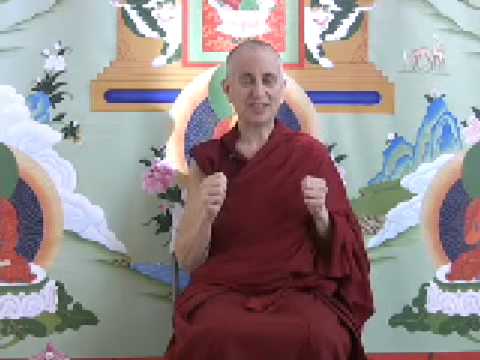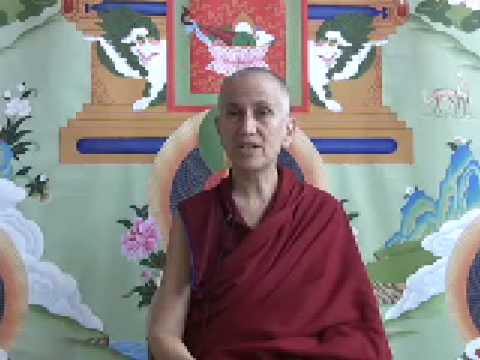Verse 31: Seeing someone suffering
Part of a series of talks on the 41 Prayers to Cultivate Bodhicitta from the Avatamsaka Sutra (the Flower Ornament Sutra).
- Compassion versus personal distress
- Being wisely compassionate
- Euthanasia and pets
- Avoiding apathy
- Staying strong
- Benefiting animals through Dharma
41 Prayers to cultivate bodhicitta: Verse 31 (download)
Verse 31. We’re moving along here:
“May all the sentient beings’ anguish be alleviated.”
This is the prayer of the bodhisattva when seeing someone suffering.
Mostly when we see somebody suffering, we think, “Oh….” Or we think we think, “May their suffering be alleviated.” But there’s this fine point here of compassion—wanting their suffering to be alleviated—and personal distress of our not wanting to have to look at them suffering.
It’s very easy to fall into personal distress, and because of personal distress we want others’ suffering to be removed. That’s good, that’s certainly not wrong or bad in any way, we definitely should want others’ suffering to be removed for no matter what reason. The difficulty is, if we fall into personal distress our mind gets cloudy, and we’re not sure of what is the best way to remove their suffering because we just want the situation to go away because we find it so painful. By wanting it to go away so badly, we often don’t deal with it in a really good way. This comes up a lot around issues of euthanasia, especially people euthanizing their pets. People write and say, “I just can’t stand to see my dog,” or cat, or whatever it is, “suffer, and the vet’s telling me to euthanize because that’s compassionate to put them out of suffering.” I hear this a lot. I think what’s there is our inability to sit with others’ suffering. But the mind isn’t thinking with a broad picture at that time about what will really eliminate that being’s suffering.
When this question was put to Lama Yeshe, he would always say, “If you know exactly where that animal is going to be reborn and you know exactly that they’re going to be reborn in a better situation than the one they’re currently in, then yes, euthanize them, it’s not causing suffering.” But the question is, do we have that psychic power to know where someone’s going to be reborn? No. So in our attempt to eliminate their suffering, we may actually send them more rapidly to a lower realm where they’re experiencing more suffering because we can’t endure to see the suffering.
It’s a tricky balance, because then some people go to this thing of saying, “Well then, it must be just their karma to suffer and we shouldn’t interfere if somebody’s suffering at all, because it’s their karma.” No, that’s not correct either. If there’s a possibility to alleviate suffering, we should definitely alleviate it. We shouldn’t just say that’s somebody’s karma. The thing is to build up the strength within ourselves so that we can endure seeing others’ suffering, be it physical suffering, emotional suffering, the confusion with which they live their lives and make bad decisions. That we have the strength inside to bear witnessing that without feeling like we have to hurry up and fix the problem because we can’t stand it.
But also to not go from the extreme of hurrying it up and fixing it because we can’t stand it to the extreme of being totally apathetic. Being able to bear the suffering and really see what will benefit in this situation for the long perspective. In cases where people have pets and so on, what I often recommend for them to do is then do a lot of chanting or say their prayers out loud, and do this before the pet’s really sick, too. [To an animal on Venerable’s left side] Are you listening? You’re sleeping, it’s ok. [laughter] If you do that, that plants good seeds in their mind, and for as long as they’re in that life and you can plant good seeds in their mind through their even hearing the Dharma, even if they don’t understand it, that’s being of benefit to them. Even though it’s painful to watch them suffer, we can also do something beneficial at that time.
Venerable Thubten Chodron
Venerable Chodron emphasizes the practical application of Buddha’s teachings in our daily lives and is especially skilled at explaining them in ways easily understood and practiced by Westerners. She is well known for her warm, humorous, and lucid teachings. She was ordained as a Buddhist nun in 1977 by Kyabje Ling Rinpoche in Dharamsala, India, and in 1986 she received bhikshuni (full) ordination in Taiwan. Read her full bio.


